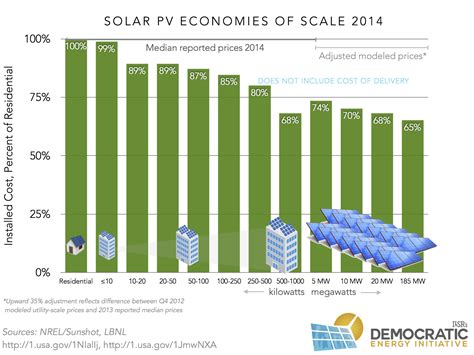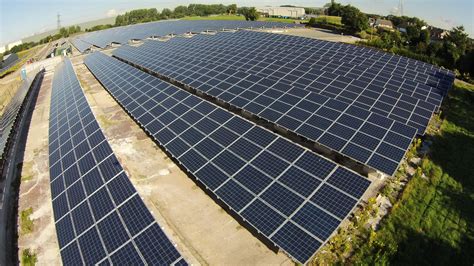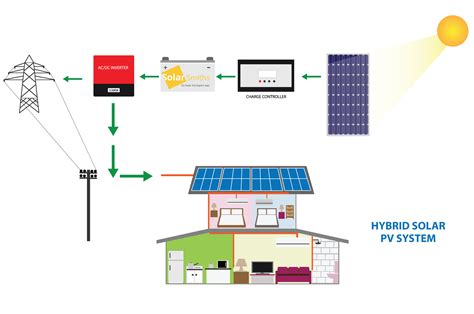The Role of Solar Energy in Commercial and Industrial Sectors

Solar energy has become an increasingly popular source of renewable energy in recent years, particularly in the commercial and industrial sectors. With advancements in technology and decreasing costs, many businesses are turning to solar power as a sustainable and cost-effective solution for their energy needs. In this article, we will explore the benefits of solar energy for commercial and industrial sectors, as well as the challenges and opportunities facing businesses looking to invest in solar power.
- Benefits of Solar Energy in Commercial and Industrial Sectors
- 1. Cost Savings
- 2. Sustainability
- 3. Energy Independence
- Challenges Facing Solar Energy in Commercial and Industrial Sectors
- 1. Upfront Costs
- 2. Intermittent Nature of Solar Energy
- 3. Regulatory and Policy Barriers
- Opportunities for Solar Energy in Commercial and Industrial Sectors
- 1. Tax Incentives
- 2. Energy Efficiency
- 3. Corporate Social Responsibility
- Conclusion
Benefits of Solar Energy in Commercial and Industrial Sectors
1. Cost Savings
One of the primary benefits of solar energy for commercial and industrial sectors is cost savings. By generating their own electricity through solar panels, businesses can significantly reduce their dependence on the grid and lower their energy bills. With the cost of solar panels continuing to decrease, the return on investment for solar energy systems has become increasingly attractive for businesses.
2. Sustainability
Another key benefit of solar energy is its sustainability. Unlike fossil fuels, solar energy is a renewable resource that does not produce harmful emissions. By harnessing the power of the sun, businesses can reduce their carbon footprint and contribute to a cleaner environment. This commitment to sustainability can also help businesses attract environmentally-conscious customers and investors.
3. Energy Independence
By generating their own electricity through solar panels, businesses can achieve a greater degree of energy independence. This can be particularly valuable in times of power outages or grid failures, as businesses with solar energy systems can continue to operate without interruption. Energy independence also provides businesses with more control over their energy costs and reduces their vulnerability to fluctuations in the energy market.
Challenges Facing Solar Energy in Commercial and Industrial Sectors
1. Upfront Costs
One of the primary challenges facing businesses looking to invest in solar energy is the upfront costs associated with installing solar panels. While the cost of solar panels has decreased in recent years, the initial investment can still be significant for many businesses. However, there are financing options available, such as solar leases and power purchase agreements, that can help businesses overcome this challenge.
2. Intermittent Nature of Solar Energy
Another challenge facing solar energy in commercial and industrial sectors is the intermittent nature of solar power. Solar energy production is dependent on sunlight, which means that energy generation can fluctuate throughout the day and seasonally. To mitigate this challenge, businesses can invest in energy storage solutions, such as batteries, to store excess energy generated during sunny periods for use when sunlight is not available.
3. Regulatory and Policy Barriers
Regulatory and policy barriers can also pose challenges for businesses looking to invest in solar energy. Depending on the location, businesses may face restrictions or limitations on solar installations, as well as varying incentives and rebates for solar energy systems. Businesses must navigate these regulatory barriers to ensure compliance and maximize the benefits of solar power for their operations.
Opportunities for Solar Energy in Commercial and Industrial Sectors
1. Tax Incentives
One of the key opportunities for businesses looking to invest in solar energy is the availability of tax incentives and rebates. Many governments offer tax credits for businesses that install solar energy systems, which can help offset the upfront costs of installation. In addition, some utility companies offer rebates or incentives for businesses that generate their own electricity through solar power.
2. Energy Efficiency
Businesses can also take advantage of energy efficiency opportunities when investing in solar energy. By conducting an energy audit and implementing energy-saving measures, businesses can reduce their overall energy consumption and maximize the benefits of their solar energy system. This holistic approach to energy management can result in even greater cost savings and environmental benefits for businesses.
3. Corporate Social Responsibility
Investing in solar energy can also provide businesses with opportunities to demonstrate their commitment to corporate social responsibility. By embracing sustainable practices and reducing their carbon footprint, businesses can enhance their brand reputation and appeal to environmentally-conscious consumers. This commitment to sustainability can also attract and retain top talent, as employees increasingly prioritize working for socially responsible companies.
Conclusion
In conclusion, solar energy has the potential to revolutionize the commercial and industrial sectors by providing cost-effective, sustainable, and reliable energy solutions. While there are challenges and barriers to overcome, the benefits of solar energy far outweigh the risks for businesses willing to invest in this renewable resource. By seizing opportunities for tax incentives, energy efficiency, and corporate social responsibility, businesses can position themselves as leaders in the transition to a clean energy future.
Learn More :
 The Future of Energy Sustainability: Harnessing Solar Energy
22 February 2024 by Admin
The Future of Energy Sustainability: Harnessing Solar Energy
22 February 2024 by Admin
As the world continues to face challenges in meeting energy demands while also reducing carbon emissions, the focus has turned to renewable energy sources. Among these sources, solar energy stands out...
 Challenges and Solutions in Solar Energy Implementation
22 February 2024 by Admin
Challenges and Solutions in Solar Energy Implementation
22 February 2024 by Admin
Solar energy is a renewable source of energy that has gained popularity in recent years due to its environmental benefits and decreasing costs. However, there are still challenges that need to be over...
 The Application of Solar Energy in Residential Settings
22 February 2024 by Admin
The Application of Solar Energy in Residential Settings
22 February 2024 by Admin
Solar energy is a renewable source of energy that has gained popularity in recent years due to its numerous benefits, including its low environmental impact and potential cost savings. In residential ...
 The Role of Solar Energy in Space Exploration
22 February 2024 by Admin
The Role of Solar Energy in Space Exploration
22 February 2024 by Admin
Solar energy has played a crucial role in the advancements of space exploration. Since the beginning of space travel, solar power has been utilized to fuel spacecrafts, power rovers on other planets, ...
 The Impact of Solar Energy on Job Creation
22 February 2024 by Admin
The Impact of Solar Energy on Job Creation
22 February 2024 by Admin
Solar energy has become a major player in the renewable energy sector, with more and more countries turning to solar power as a sustainable and clean energy source. In addition to its environmental be...
 The Importance of Government Incentives for Solar Energy Adoption
22 February 2024 by Admin
The Importance of Government Incentives for Solar Energy Adoption
22 February 2024 by Admin
Solar energy has been gaining popularity as a clean and renewable source of energy that can help reduce our reliance on fossil fuels. However, the high upfront costs of installing solar panels can be ...
 Solar Power in Developing Countries
22 February 2024 by Admin
Solar Power in Developing Countries
22 February 2024 by Admin
Solar power, also known as solar energy, has become an increasingly popular source of renewable energy in developing countries. With the advancement of technology and the decreasing costs of solar pan...
 The Role of Solar Energy in Climate Change Mitigation
22 February 2024 by Admin
The Role of Solar Energy in Climate Change Mitigation
22 February 2024 by Admin
Climate change is one of the most pressing issues of our time, with the potential to greatly impact the future of our planet. As global temperatures rise and extreme weather events become more common,...
 The Economics of Solar Power Costs and Benefits
22 February 2024 by Admin
The Economics of Solar Power Costs and Benefits
22 February 2024 by Admin
As the world continues to face pressing environmental challenges, the need for renewable energy sources has become more urgent than ever. Solar power, in particular, has emerged as a promising alterna...
 The Components and Construction of Solar Panels
22 February 2024 by Admin
The Components and Construction of Solar Panels
22 February 2024 by Admin
Solar panels are an essential part of renewable energy systems, converting sunlight into electricity. Understanding the components and construction of solar panels is crucial for anyone looking to inv...
 The Importance of Solar Energy Conversion Efficiency
22 February 2024 by Admin
The Importance of Solar Energy Conversion Efficiency
22 February 2024 by Admin
Solar energy is a renewable and abundant source of energy that has the potential to meet a significant portion of our energy needs. With advancements in technology, solar energy has become more afford...
 Advancements in Solar Technology
22 February 2024 by Admin
Advancements in Solar Technology
22 February 2024 by Admin
Solar technology has come a long way in recent years, with new advancements being made constantly to improve efficiency, affordability, and accessibility. From advancements in solar panel technology t...
![Environmental Impact of Solar Energy [Positive/Negative]](/image/blogseasourcedatacom/the-environmental-impact-of-solar-energy.jpg) The Environmental Impact of Solar Energy
22 February 2024 by Admin
The Environmental Impact of Solar Energy
22 February 2024 by Admin
Solar energy is a renewable source of power that has gained popularity in recent years due to its numerous benefits, including reducing reliance on fossil fuels and decreasing greenhouse gas emissions...
 Solar Energy Storage Solutions
22 February 2024 by Admin
Solar Energy Storage Solutions
22 February 2024 by Admin
Solar energy has become an increasingly popular renewable energy source in recent years. As technology continues to advance, more and more homeowners and businesses are turning to solar panels to powe...
 The Rise of Solar Farms: Large-Scale Solar Power Generation
22 February 2024 by Admin
The Rise of Solar Farms: Large-Scale Solar Power Generation
22 February 2024 by Admin
Solar power has gained significant traction in recent years as a clean, renewable energy source that has the potential to revolutionize the way we generate electricity. Solar farms, also known as sola...
 The Basics of Solar Energy
22 February 2024 by Admin
The Basics of Solar Energy
22 February 2024 by Admin
Solar energy is a renewable source of energy that is derived from the sun's rays. It is becoming increasingly popular as countries around the world strive to reduce their reliance on fossil fuels and ...
 Types of Solar Power Systems
22 February 2024 by Admin
Types of Solar Power Systems
22 February 2024 by Admin
Solar power systems are becoming increasingly popular as a renewable energy source. There are several different types of solar power systems available, each with their own unique features and benefits...
 Photovoltaic Technology: How Solar Cells Work
22 February 2024 by Admin
Photovoltaic Technology: How Solar Cells Work
22 February 2024 by Admin
Photovoltaic technology, also known as solar cell technology, is a renewable energy source that converts sunlight into electricity. Solar cells are made of materials that exhibit the photovoltaic effe...
 Harnessing the Power of the Sun: A Sustainable Energy Solution
22 February 2024 by Admin
Harnessing the Power of the Sun: A Sustainable Energy Solution
22 February 2024 by Admin
The sun has long been a powerful source of energy for our planet. From providing warmth and light to supporting the growth of plants through photosynthesis, the sun plays a crucial role in sustaining ...